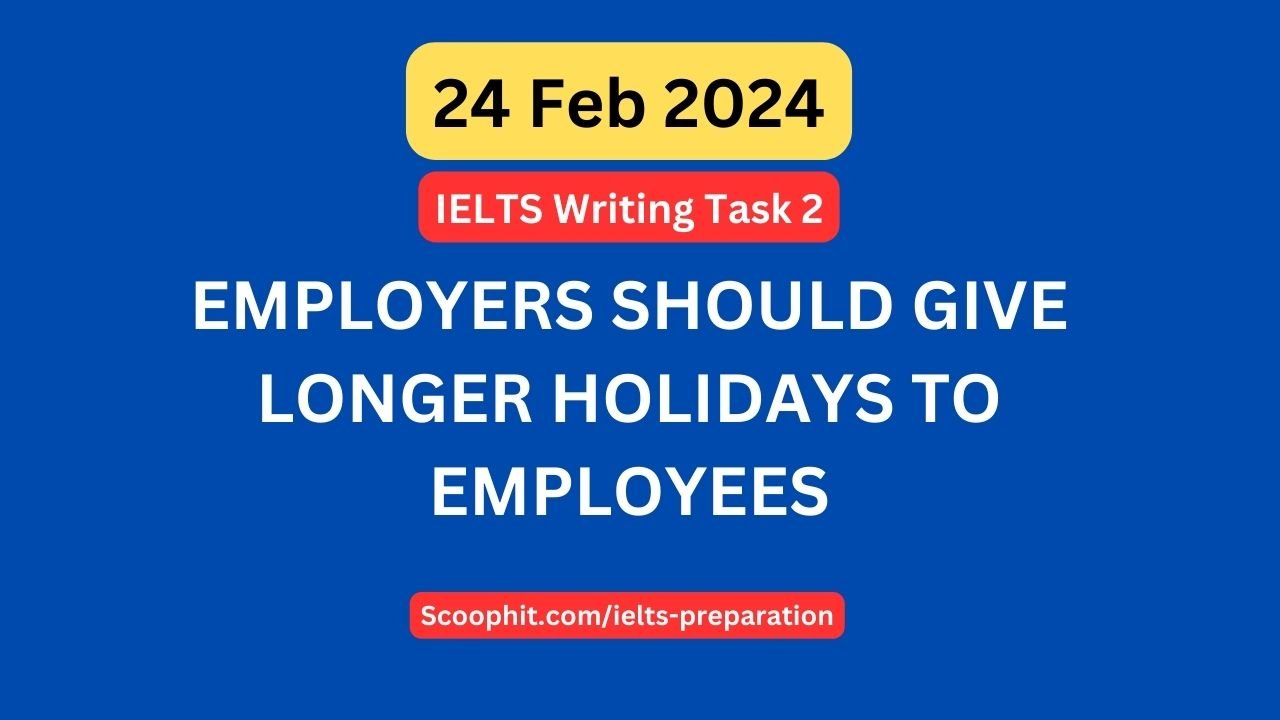IELTS Writing Task 2 (EMPLOYERS SHOULD GIVE LONGER HOLIDAYS TO EMPLOYEES) asked on 24 Feb 2024. Here is a sample answer of the given topic. You can also get different ideas related to the same topic which is given below.
Table of Contents
EMPLOYERS SHOULD GIVE LONGER HOLIDAYS TO EMPLOYEES
In contemporary society, the question of whether employers should offer extended holidays to their employees as a means to boost work productivity has sparked considerable debate. While some argue that longer breaks might lead to decreased efficiency, others contend that adequate rest and rejuvenation can significantly enhance job performance. This essay will delve into the merits of providing longer holidays to employees and how it can foster a more productive workforce.
First and foremost, extended holidays offer employees the opportunity to unwind and recharge, both physically and mentally. In today’s fast-paced work environments, individuals often find themselves grappling with high levels of stress and burnout. Longer breaks provide a crucial respite from the demands of the workplace, allowing employees to return with renewed energy and focus. Research has shown that adequate rest can improve cognitive function, creativity, and problem-solving skills, all of which are essential for performing well on the job.
Moreover, extended holidays can foster a healthier work-life balance, which is vital for overall job satisfaction and well-being. When employees feel valued and supported by their employers, they are more likely to exhibit greater loyalty and commitment to their work. By offering longer breaks, employers demonstrate their recognition of the importance of leisure time and personal fulfillment, which can contribute to a more positive organizational culture.
However, it is important to acknowledge that implementing longer holidays may pose logistical challenges for some employers, particularly in industries with tight deadlines or seasonal demands. To address this concern, employers can explore alternative scheduling options, such as staggered holidays or flexible work arrangements, to ensure that productivity levels are maintained.
In conclusion, the provision of longer holidays can have a multitude of benefits for both employees and employers alike. By allowing individuals the time and space to rest, recharge, and prioritize their well-being, employers can cultivate a more engaged, motivated, and productive workforce. Ultimately, investing in extended holidays is not just a gesture of goodwill; it is a strategic decision that can yield significareturns in terms of job performance, satisfaction, and overall organizational success.
Here are some additional ideas and arguments regarding the topic of whether employers should give longer holidays to employees to encourage them to do their job well:
- Improved Mental Health: Longer holidays can contribute to better mental health outcomes for employees. Mental health issues such as stress, anxiety, and depression are prevalent in the workplace, and extended breaks provide employees with the time they need to relax and focus on self-care activities, ultimately leading to improved mental well-being.
- Enhanced Creativity and Innovation: Breaks from work allow employees to engage in activities outside of their regular routine, which can stimulate creativity and innovation. Whether it’s traveling to new destinations, pursuing hobbies, or spending quality time with loved ones, extended holidays provide the opportunity for new experiences and perspectives that can be valuable in the workplace.
- Increased Employee Engagement and Retention: Offering longer holidays can be a powerful tool for increasing employee engagement and retention. When employees feel that their employer values their well-being and respects their need for time off, they are more likely to feel committed to their job and less inclined to seek opportunities elsewhere.
- Boosted Morale and Team Dynamics: Extended holidays can have a positive impact on workplace morale and team dynamics. When employees return from a rejuvenating break, they are likely to be more enthusiastic and motivated, which can have a ripple effect on the entire team. Additionally, shared experiences during time off can strengthen bonds among colleagues and foster a sense of camaraderie.
- Promotion of Work-Life Balance: Longer holidays promote a healthier work-life balance, which is essential for overall job satisfaction and employee well-being. Employees who feel that they have time to pursue personal interests and spend quality time with family and friends are likely to be more content and fulfilled in both their professional and personal lives.
- Potential for Increased Productivity Post-Holiday: Research has shown that employees often experience a surge in productivity following a period of rest and relaxation. By providing longer holidays, employers can capitalize on this post-holiday productivity boost, ultimately leading to greater efficiency and output in the long run.
- Competitive Advantage in Recruitment: Companies that offer generous holiday benefits may have a competitive advantage in attracting top talent. Job seekers are increasingly prioritizing work-life balance and employee well-being when evaluating potential employers, and offering longer holidays can make a company more attractive to prospective employees.
visit our Youtube Channel for Latest Updates and Exam review
